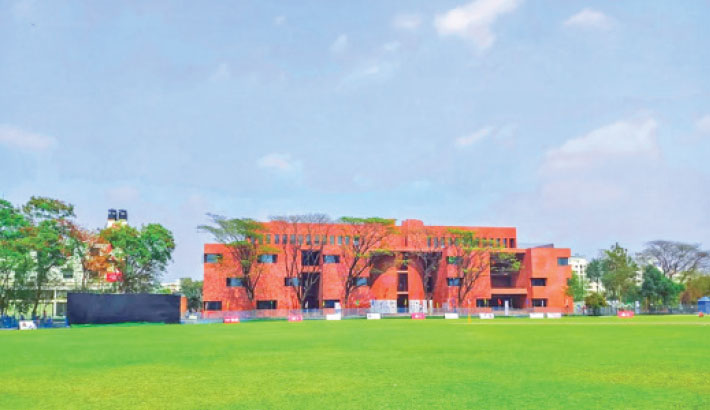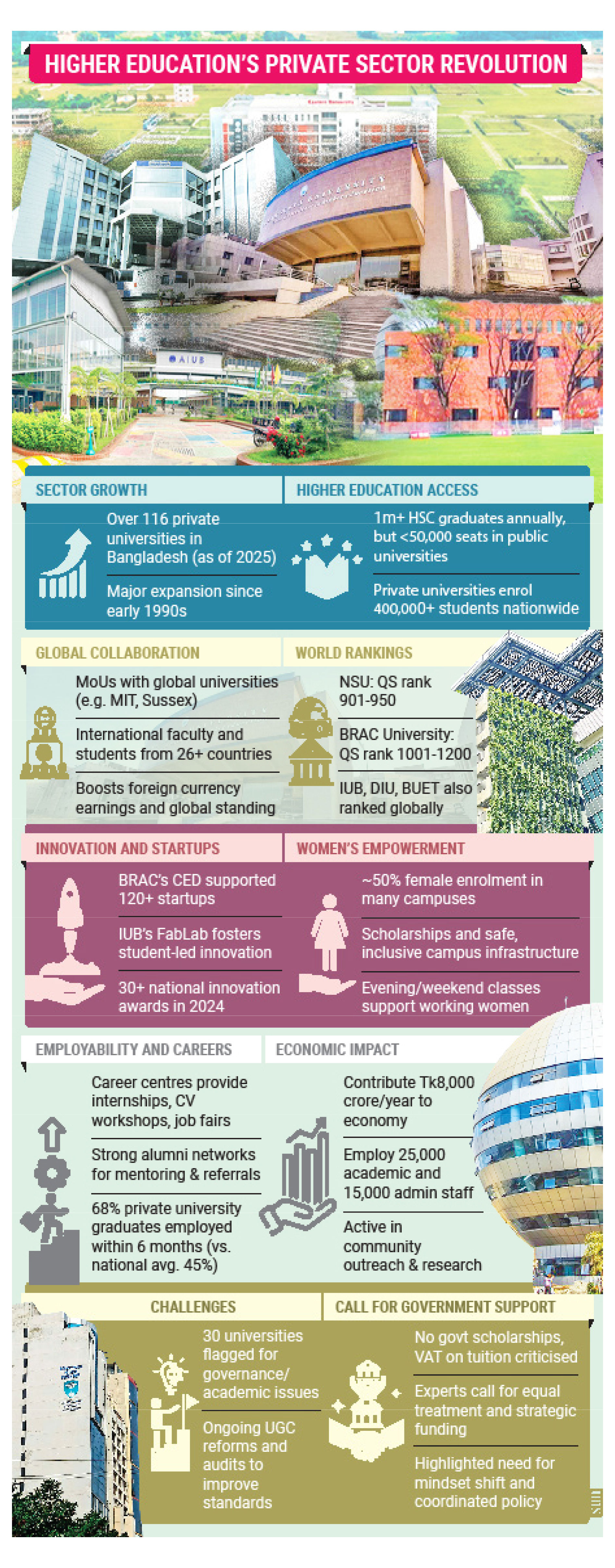The Next Frontier in Education
Private universities reshape higher education in Bangladesh
Rajib Kanti Roy, Dhaka
Published: 11 May 2025

Over the past three and a half decades, private universities in Bangladesh have significantly reshaped the higher education sector, addressing rising enrolment pressures, fostering academic innovation, and contributing to economic development. From just a handful of institutions in the early 1990s, the sector has expanded to include 116 private universities, according to the University Grants Commission (UGC) website.

University of Liberal Arts Bangladesh
Meeting the demand for higher education
Bangladesh produces over one million Higher Secondary Certificate (HSC) graduates annually, yet public universities can admit fewer than 50,000 students into undergraduate programmes each year.
This stark gap has been effectively addressed by private universities, which now enrol more than 400,000 students nationwide, making them a cornerstone of higher education access in the country.

North South University (NSU)
Academic excellence and internationalisation
Many private universities have made bold strides towards internationalisation and academic modernisation. They have signed Memoranda of Understanding (MoUs) with foreign institutions for academic exchanges, dual-degree programmes, and research collaboration.
For instance, BRAC University has partnered with the Massachusetts Institute of Technology (MIT) and the University of Sussex to offer collaborative research opportunities and joint degrees. North South University (NSU) hosts over 50 foreign faculty members and offers courses aligned with North American academic standards. Several other universities maintain partnerships with institutions in the US, UK, Australia, and Malaysia.
With students from over 26 countries – including the USA, Canada, China, and Japan – these universities have become hubs of cultural exchange and academic cooperation. This not only enhances Bangladesh’s global standing but also contributes to foreign currency earnings, highlighting the country’s emergence as a centre for quality education.

BRAC University
 Gaining global recognition
Gaining global recognition
An increasing number of Bangladeshi private universities are being recognised in global university rankings. NSU and BRAC University are particularly notable, with NSU ranked between 901-950 in the QS World University Rankings 2025, while BRAC University is positioned between 1001 and 1200. Independent University, Bangladesh (IUB) also features in the QS rankings, within the 1201-1400 band.
In addition, Daffodil International University, alongside the Bangladesh University of Engineering and Technology (BUET), has achieved the highest rankings among Bangladeshi institutions in the Times Higher Education (THE) Asia University Rankings 2025.
Promoting innovation and entrepreneurship
Private universities are cultivating a generation of entrepreneurs through dedicated start-up incubators and innovation hubs. BRAC University’s Centre for Entrepreneurship Development (CED) has supported over 120 start-ups, while IUB’s FabLab provides prototyping tools and mentorship for student innovators.
In 2024 alone, students from private universities won over 30 national innovation awards, including accolades from the ICT Division’s Startup Bangladesh programme and the Bangladesh Innovation Forum.
Empowering women
Private universities in Bangladesh play a significant role in empowering women through education, leadership opportunities, and supportive environments. They have helped bridge the gender gap in higher education by offering more accessible and flexible admission policies. Many institutions report close to 50% female enrolment, with some surpassing that figure in fields such as business, law, and computer science.
Targeted scholarships for female students – especially those from rural or underprivileged backgrounds – enable them to pursue higher education without financial strain. These universities also invest in infrastructure and policies that ensure a safe and inclusive environment, including female dormitories, transport services, grievance cells, and harassment prevention committees.
Evening and weekend classes are also available, supporting women who juggle academic responsibilities with work or family obligations – particularly relevant in conservative or traditional households.
Job-oriented programmes and alumni networks
Private universities are increasingly offering job-oriented programmes aligned with market needs. These often include practical training, industry projects, and internships as core components.
Most leading private universities have dedicated career development centres that organise job fairs and on-campus recruitment drives, arrange CV-writing workshops and mock interviews, offer career counselling, and build corporate partnerships with top employers in banking, IT, telecommunications, NGOs, and multinational corporations.
Strong alumni networks also play a key role. Mentorship programmes pair students with successful alumni, while alumni in influential positions frequently refer graduates for job opportunities. Networking events and alumni talks help students establish professional connections early in their careers.
The outcomes are encouraging. A 2023 study by the Centre for Policy Dialogue (CPD) found that 68% of private university graduates secured employment within six months of graduation – significantly higher than the national average of 45% across all universities.
Social and economic contributions
The private university sector contributes approximately Tk8,000 crore annually to the national economy through tuition fees, employment, infrastructure, and service procurement, according to a 2023 report by the Bangladesh Institute of Development Studies (BIDS).
These institutions employ more than 25,000 academic staff and 15,000 administrative personnel, creating stable, skilled jobs and fostering knowledge creation through faculty-led research. Many private universities are also active in community outreach.
Challenges and oversight
Despite notable successes, challenges persist. The UGC has identified around 30 private universities with governance irregularities, lack of permanent campuses, or substandard academic offerings.
Nonetheless, ongoing reforms – including mandatory UGC audits and stricter accreditation requirements – are expected to enhance quality assurance. The Association of Private Universities of Bangladesh (APUB) has also launched a self-assessment initiative and is collaborating with the Ministry of Education to standardise quality benchmarks across the sector.
A regulatory but limited government role
The Government of Bangladesh maintains a regulatory and facilitative role in the private university sector. While these universities operate independently, the government provides policy guidance and oversight through various bodies, primarily the University Grants Commission (UGC).
The UGC is responsible for licensing under the Private University Act 2010, curriculum review, audits, and enforcement of academic standards.
Need for greater government support
Governments in many countries actively support private universities despite their independent operations. This support often comes in the form of research funding, scholarships, and student financial aid.
In the United States, institutions such as Harvard, Stanford, and MIT receive billions in federal research grants from agencies like the National Institutes of Health (NIH), National Science Foundation (NSF), and Department of Defense.
In Japan, prestigious institutions like Keio University and Waseda University receive competitive grants from the Japan Society for the Promotion of Science (JSPS). In the US, federal aid programmes such as Pell Grants and FAFSA loans are available to students at accredited private universities. Similarly, in Germany and Canada, students attending recognised private institutions can access government-backed tuition support and scholarships.
In contrast, the Bangladeshi government provides very limited financial assistance or scholarships for students at private universities. Additionally, the imposition of VAT on private university tuition increases the financial burden on students and their families.
Md Fazlur Rahman, professor at the Institute of Education and Research at the University of Dhaka, remarked that this reflects a lack of strategic planning in higher education policy.
“When the government heavily funds public universities yet collects VAT from private institutions, it appears discriminatory. Private university students are also citizens and deserve access to public support,” he told the Daily Sun.
He emphasised that government support is essential for private universities to move beyond practices that compromise educational quality.
When asked whether private university graduates can join the academic ranks of public universities, he noted that while a few such appointments have occurred at Dhaka University, they remain rare.
“We must shift our mindset towards private universities and their students if we truly want to chart a hopeful course for Bangladesh’s youth in line with national development ambitions. Coordinated efforts are needed,” he concluded.

